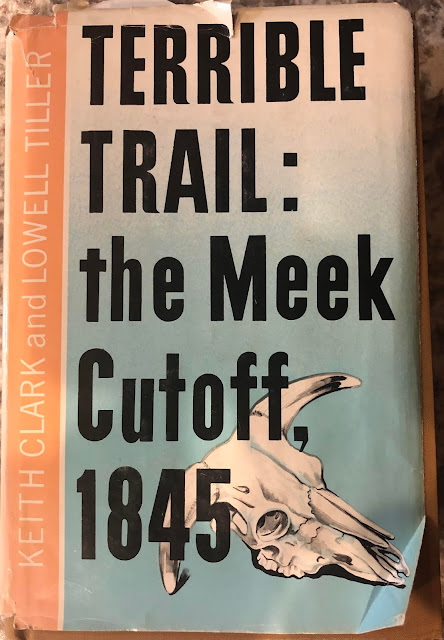#9-2020. Disaster. Terrible Trail: the Meek Cutoff, 1845
Stephen Meek, a frontiersman, was hired as a guide in Missouri for wagons trains in 1845 but apparently he was fired when they reached Fort Boise. Being out of work, led him to convince several captains of trains that he knew a shorter route to the Williamette Valley and they hired him as a guide. I am sure that the travelers were tired, hot and dusty by the time they reached Fort Boise. They knew that there was tough passage through the Blue Mountains, a long trail down the Columbia River to the Williamette Valley. Many were quick to jump at the chance of getting there faster and easier. But little did they know of the bad fortune that would occur.
The Meek Cutoff wound across the high desert area of Oregon, heading northwest to the Williamette Valley. Stephen Meek had some idea of where to go, but there were many problems on the trail. The trail was difficult, water was impossible to find in many areas, many people were sick and it was hot and dry. Without water, many oxen gave up and died. There were people upset with the guide, threatening to kill him.
The wagon train had endured many hardships on the trip, but the lack of water, fatigue and running low on provisions began to take a toll on the pioneers. It was even reported that in desperation many put salt on grass for food.
As John Lloyd set out from Missouri, with his 2 wagons and 10 family members, what was he thinking?
Was he thinking of the difficult trails ahead of him, the length of the trip, the hardships endured and the possibility that they might not make it to Oregon? Was the promise of a better future or opportunity or prosperity so enticing, that one would think only of the end result, not of the trip?
John and family set out in 1845 with the “The Savannah Oregon Emigrating Society” that was also known as the “Tetherow Train”. Solomon Tetherow was the captain [not a guide] for the main body of wagon for the full distance. What was his experience and qualifications?
From Captain Tetherow’s journal, a wagon train rule required each outfit to have 100-150 lbs of flour, 75 lbs of meal and 50 lbs of bacon for every person.
John Lloyd was elected to the executive council of the “Savannah Oregon Emigrating Society” at a meeting on the Missouri bottom on 28 April 1845. Many of the people listed on the wagon train roster were somehow connected to the Lloyd family, mostly by marriage. Since the number of wagons was large, they were broken down into 4 platoons, each with captains,so a hollow square could be easily formed every night,
In Lewis A. McArthur, “Mary’s River,” Oregon Georgraphic Names, Portland, Oregon, Oregon Historical Society, 1952 edition,, p. 389 states that St. Clair and John Lloyd were alternate captains of the last platoons to take the Cutoff.
John wrote to his brother, Robert, in Rutledge, Grainger County, Tennessee on 25 March 1847 from Polk County, Oregon Territory.
(I assume this is the first letter written from Oregon Territory to his brother.)
He stated that they were 6 months and 3 days from the time they left their old home until we got to Linton on the Williamette. They had no more bad luck than is common for Oregon immigrants. They lost 18 head of cattle out of 37 and one horse. They found the road passable but many bad places. He went on stating that neither of his wagons got turned over on the trip. It is without timber most of the way. He stated that there were about 700 wagons, 10 or 12,000 head of cattle, a good many horses and mules, little rain and dust in abundance. He also stated that they did not all travel in the same company but in a good many small companies. He said they were not molested by the Indians but they stole a good many horses. He continues by saying that they crossed all the waters that we came to without any difficulty except green river and deshoots (Deschutes) and they rafted across the green river but had to take their wagons apart to cross the deshoots. John stated that their provisions held out well with the exception of “flower” (flour) which got somewhat scare. He stated that they had bacon, coffee, sugar, tea rice and dried fruit after we got to our Journeys end. The trip from the states to Oregon is a journey that can be performed with very little ease.
While John endured hardships, his letter indicates that they were on the Meek Cutoff as he wrote they had to take apart the wagons to cross the Deschutes river. All the members of his family arrived in Oregon so while they watched disasters around them, they were safe.
If you are interested in the Meek Cutoff of 1845, I have listed the sources that I have used. They are very interesting ready to understand the hardships that the pioneers endured crossing the Plains to prosperity.
Clark, Keith and Lowell Tiller, Terrible Trail: The Meek Cutoff, 1845. Caldwell, Idaho: The Caxton Printers LTD, 1967
Wikipedia, (https://en.wikipedia.org/wiki/Meek_Cutoff), “Meek Cutoff”, viewed 23 February 2020.
Lockley, Fred. Captain Sol. Tetherow, Wagon Train Master. Pamphlet. (Portland, Oregon: Fred Lockley) no date.
The story was even made into a movie!



Thanks for sharing!
ReplyDeleteGreat story!
ReplyDeleteLove learning all this new history - thanks for sharing !
ReplyDeleteThis is an interesting story as I live in the area of Old Fort Boise, and have been to the Oregon Trail Center in Baker City Oregon. I know the country and am always impressed with those who crossed it back then!
ReplyDelete